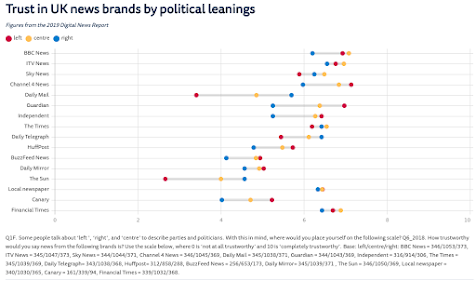The BBC has been subject to dramatic changes in its Charter over the past 14 years and this has had a deeply negative effect on the Corporation.
BBC TV news suffered a sudden drop of around 5m viewers after the EU Referendum. The BBC was widely perceived to be biased during the Referendum and its most prominent presenter at the time, John Humphrys (who voted Remain) confessed that bias was rife in the BBC. See Broadcaster John Humphrys savages bias at the BBC.
 |
| BBC News loses 1m viewers a year |
However, outside of the Referendum the BBC News still appears to be trusted, especially by the left and centre, probably because the viewers are unaware that the BBC Charter offered no protection against bias from 2007 to 2017.
 |
| Source: Reuters Institute |
Any new Charter must address the problem of anecdotal interviews and the omission of news and information that supports non-BBC views. The role of Ofcom should be replaced by a Broadcast Advisory Council with an explicit brief to monitor bias and to contain campaigning by BBC producers, even if these campaigns appear justified. Campaigns can be implemented through current affairs and drama and can be identified by the frequency with which a particular viewpoint is being expressed. It cannot be the role of the National Broadcaster to indoctrinate the population even if the BBC management believes that a campaign is for the "good" of the country.
The overseas broadcasts of the BBC are particularly worrying. Any new Charter will need to impose a pro-British stance on the BBC Global operation that is implemented through Foreign Office monitoring. Although the BBC produces viewing figures that suggest it is a huge "success" overseas it is apparent to any traveller that the BBC is steadily being demoted in hotel satellite TV menus and increasingly entirely missing. This is especially the case in Muslim and staunchly Catholic areas such as Central and South America. Hoteliers in these areas often find BBC content disgusting and biased. In Central Asia and China the BBC is largely unavailable. China Global is rapidly replacing the BBC globally and I hate to say that its content is often surprisingly balanced and sober to lure in the overseas audience. The BBC cannot represent the UK abroad if it alienates the audience that it really needs to reach. BBC global services are also nakedly Internationalist which leads them to portray the UK as "just another country" to such an extent that it is frequently anti-British. We should not be paying licence fees so that the BBC can crow about high viewing figures in the USA and India when these are based on anti-British sentiment.
The BBC Radio World Service is maintaining its audience but the reservations mentioned above about BBC global TV also apply to radio. Again the Foreign Office should closely monitor content to ensure that it is consistent with the interests of the UK.
 |
| media.info |
The USA is a clear example of the damage that can be done by permitting the mainstream media to be partisan - see The Mainstream Media are to Blame for Political Unrest - like the UK the USA deregulated its media in the 21st century and has demonstrated the consequences.
20/1/2021

Comments